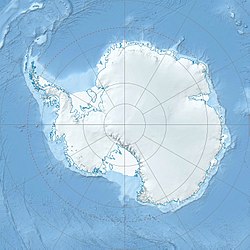Pensacola Mountains
| Pensacola Mountains | ||
|---|---|---|
 | ||
| Lage | Queen Elizabeth Land, Westantarktika | |
| Teil des | Transantarktischen Gebirges | |
| Koordinaten | 83° 45′ S, 55° 0′ W | |
Die Pensacola Mountains sind eine große Gruppe von Gebirgszügen und einzelnen Berggipfeln, die sich in nordost-südwestlicher Ausrichtung über rund 450 Kilometer im westantarktischen Queen Elizabeth Land erstrecken. Zu ihnen gehören die Argentina Range, die Forrestal Range, das Dufek-Massiv, die Cordiner Peaks, die Neptune Range, die Patuxent Range, die Rambo-Nunatakker und der Pecora Escarpment. Durch sie fließen der Foundation-Eisstrom und der Support-Force-Gletscher nordwärts zum Filchner-Ronne-Schelfeis.
Entdeckt und fotografiert wurden die Pensacola Mountains während des durch die United States Navy durchgeführten Transkontinentalfluges am 13. Januar 1956 im Rahmen der ersten Operation Deep Freeze vom McMurdo-Sund zum Weddell-Meer und zurück. Das Advisory Committee on Antarctic Names benannte sie 1957 nach der Naval Air Station Pensacola in Erinnerung an die historische Bedeutung dieser Einrichtung bei der Pilotenausbildung. Die kartografische Erfassung des Gebiets erfolgte durch den United States Geological Survey und mithilfe von Luftaufnahmen aus den Jahren 1956 bis 1967.
Weblinks
- Pensacola Mountains. In: Geographic Names Information System. United States Geological Survey, United States Department of the Interior, archiviert vom (englisch).
- Pensacola Mountains auf geographic.org (englisch)
- Cordiner Peaks, Dufek-Massiv und Spanley Rocks
- Support-Force-Gletscher und Argentina Range
- Rambo-Nunatakker und Foundation-Eisstrom
Auf dieser Seite verwendete Medien
Map of Antarctica by the United States Antarctic Resource Center of the US Geological Society.
Autor/Urheber: NASA / James Yungel, Lizenz: CC BY 2.0
A glacier in the Pensacola Range of Antarctica seen from the DC-8 on the Oct. 28, 2012 survey of the Foundation and Support Force ice streams.
NASA's Operation IceBridge is an airborne science mission to study Earth's polar ice. For more information about IceBridge, visit: www.nasa.gov/icebridgeAutor/Urheber: Alexrk2, Lizenz: CC BY-SA 3.0
Physische Positionskarte Antarktis, Mittabstandstreue Azimutalprojektion
Map of Antarctica by the United States Antarctic Resource Center of the US Geological Society.
Topographic Map Sheet of Antarctic Coverage, scale 1:250,000
Map of Antarctica by the United States Antarctic Resource Center of the US Geological Society.
1:250,000-scale topographic reconnaissance map of the Blackburn Nunatak area from 60°-67'30'W to 83°-84°S in Antarctica. Mapped, edited and published by the U.S. Geological Survey in cooperation with the National Science Foundation.












